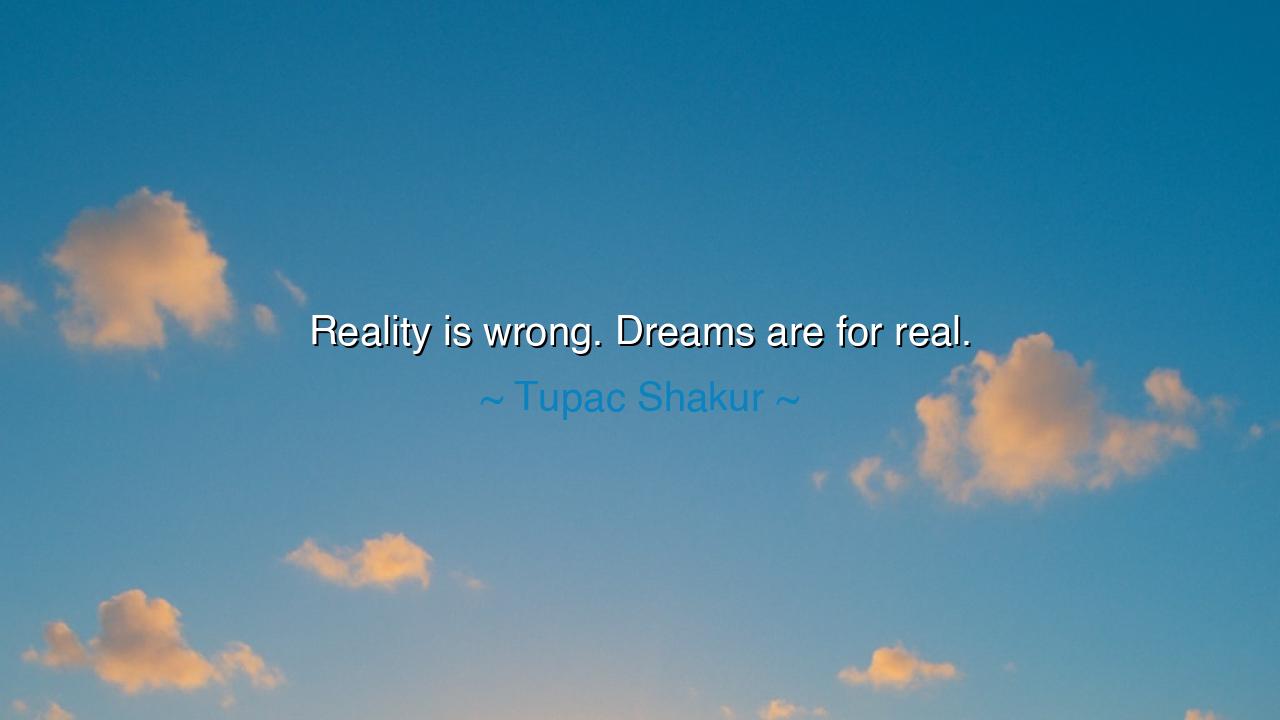
Reality is wrong. Dreams are for real.






“Reality is wrong. Dreams are for real.” Thus spoke Tupac Shakur, the poet of the streets, the prophet of a generation, whose words burned with both pain and promise. In this bold declaration, he did not reject the world, but rather revealed its deep contradiction—the truth that the reality we see is often twisted, unjust, and cruel, while the dreams that rise from the human soul are pure, sacred, and true. Through these words, Tupac gives voice to all who have lived within a world that denies their worth, yet still dare to imagine something greater.
The origin of this quote lies in the heart of Tupac’s own struggle. Born into hardship, surrounded by violence and poverty, he saw the harshness of “reality” firsthand—the broken systems, the despair of the oppressed, the suffering of those forgotten by society. But even amid that darkness, he dreamed. He dreamed of justice, of freedom, of love, of peace among the forgotten and the damned. To him, the world as it stood was wrong, not because it was real, but because it failed to reflect what humanity could be. His dreams, however, were not illusions—they were the truer reality, glimpses of what might come if people dared to believe in something better.
When Tupac said “Dreams are for real,” he was not speaking of fantasy, but of the soul’s higher truth. The dream is the seed of all transformation. Every revolution begins in the mind before it takes shape in the world. Every work of art, every act of courage, every change in human destiny begins with one person who refuses to accept “reality” as final. The dreamer sees through the veil of the present and touches the future. To live without dreams is to live as a prisoner; to dream, even in chains, is to already be free.
Throughout history, there have always been those who looked upon their reality and called it wrong—and by dreaming, made it right. Dr. Martin Luther King Jr., standing before the broken promises of America, declared, “I have a dream.” His words were not naïve—they were prophetic. Nelson Mandela, imprisoned for decades, dreamed of a South Africa free from apartheid, and though the world around him said it was impossible, he held his dream as truth. Galileo, condemned by his time, dreamed of a universe governed not by superstition but by light. All these men stood in the wrongness of “reality” and reached toward something realer than reality itself—the power of the dream.
In Tupac’s time, his reality was the streets, where hope was scarce and survival was a daily battle. But his music, his poetry, and his vision transcended that world. He saw beyond the poverty and the pain to something divine within himself and others. Through his art, he spoke of struggle not as a curse, but as a calling—to dream even harder, to create beauty where none existed, to speak truth where silence ruled. He lived the paradox that the dreamer is often condemned by society for believing too much, when in truth, it is the world that believes too little.
Yet, Tupac’s message is not merely rebellion—it is faith. To call “reality wrong” is not to deny life, but to affirm its potential for transformation. The dream becomes the compass that guides the weary through the storm. In every age, the dreamers are the builders of the future, for they carry within them the blueprint of a better world. Reality may bind the body, but the dream frees the spirit. And when the spirit is free, no prison, no injustice, no despair can hold it down.
So, my child of both sorrow and hope, take these words into your heart: believe in your dreams more than you believe in your fears. The world will tell you that your vision is impossible, that reality is immovable—but remember, all that is real today was once a dream yesterday. Refuse to surrender your imagination to the tyranny of what is. Let your dream be your rebellion, your faith, and your light.
For in the end, as Tupac Shakur taught, “Reality is wrong. Dreams are for real.” The world may be flawed, but the dream remains pure; the world may fall apart, but the dream rebuilds it. It is the dream that outlives kings and conquerors, the dream that survives even death. So dream—dream with fire, dream with purpose, dream until your vision burns so bright that the darkness of the world cannot endure it. For the dream is not escape—it is creation. And it is through the dreamer that reality is remade.






AAdministratorAdministrator
Welcome, honored guests. Please leave a comment, we will respond soon